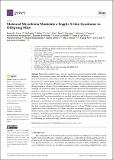| dc.contributor.author | Varian, Bernard J. | |
| dc.contributor.author | Weber, Katherine T. | |
| dc.contributor.author | Kim, Lily J. | |
| dc.contributor.author | Chavarria, Tony E. | |
| dc.contributor.author | Carrasco, Sebastian E. | |
| dc.contributor.author | Muthupalani, Sureshkumar | |
| dc.contributor.author | Poutahidis, Theofilos | |
| dc.contributor.author | Zafarullah, Marwa | |
| dc.contributor.author | Al Olaby, Reem R. | |
| dc.contributor.author | Barboza, Mariana | |
| dc.contributor.author | Solakyildirim, Kemal | |
| dc.contributor.author | Lebrilla, Carlito | |
| dc.contributor.author | Tassone, Flora | |
| dc.contributor.author | Wu, Fuqing | |
| dc.contributor.author | Alm, Eric J. | |
| dc.contributor.author | Erdman, Susan E. | |
| dc.date.accessioned | 2022-08-11T12:12:20Z | |
| dc.date.available | 2022-08-11T12:12:20Z | |
| dc.date.issued | 2022-08-08 | |
| dc.identifier.uri | https://hdl.handle.net/1721.1/144309 | |
| dc.description.abstract | Maternal microbial dysbiosis has been implicated in adverse postnatal health conditions in offspring, such as obesity, cancer, and neurological disorders. We observed that the progeny of mice fed a Westernized diet (WD) with low fiber and extra fat exhibited higher frequencies of stereotypy, hyperactivity, cranial features and lower FMRP protein expression, similar to what is typically observed in Fragile X Syndrome (FXS) in humans. We hypothesized that gut dysbiosis and inflammation during pregnancy influenced the prenatal uterine environment, leading to abnormal phenotypes in offspring. We found that oral in utero supplementation with a beneficial anti-inflammatory probiotic microbe, <i>Lactobacillus reuteri</i>, was sufficient to inhibit FXS-like phenotypes in offspring mice. Cytokine profiles in the pregnant WD females showed that their circulating levels of pro-inflammatory cytokine interleukin (Il)-17 were increased relative to matched gravid mice and to those given supplementary <i>L. reuteri</i> probiotic. To test our hypothesis of prenatal contributions to this neurodevelopmental phenotype, we performed Caesarian (C-section) births using dissimilar foster mothers to eliminate effects of maternal microbiota transferred during vaginal delivery or nursing after birth. We found that foster-reared offspring still displayed a high frequency of these FXS-like features, indicating significant in utero contributions. In contrast, matched foster-reared progeny of <i>L. reuteri</i>-treated mothers did not exhibit the FXS-like typical features, supporting a key role for microbiota during pregnancy. Our findings suggest that diet-induced dysbiosis in the prenatal uterine environment is strongly associated with the incidence of this neurological phenotype in progeny but can be alleviated by addressing gut dysbiosis through probiotic supplementation. | en_US |
| dc.publisher | Multidisciplinary Digital Publishing Institute | en_US |
| dc.relation.isversionof | http://dx.doi.org/10.3390/genes13081409 | en_US |
| dc.rights | Creative Commons Attribution | en_US |
| dc.rights.uri | https://creativecommons.org/licenses/by/4.0/ | en_US |
| dc.source | Multidisciplinary Digital Publishing Institute | en_US |
| dc.title | Maternal Microbiota Modulate a Fragile X-like Syndrome in Offspring Mice | en_US |
| dc.type | Article | en_US |
| dc.identifier.citation | Genes 13 (8): 1409 (2022) | en_US |
| dc.contributor.department | Massachusetts Institute of Technology. Division of Comparative Medicine | |
| dc.contributor.department | Massachusetts Institute of Technology. Department of Biological Engineering | |
| dc.identifier.mitlicense | PUBLISHER_CC | |
| dc.eprint.version | Final published version | en_US |
| dc.type.uri | http://purl.org/eprint/type/JournalArticle | en_US |
| eprint.status | http://purl.org/eprint/status/PeerReviewed | en_US |
| dc.date.updated | 2022-08-11T11:49:56Z | |
| dspace.date.submission | 2022-08-11T11:49:56Z | |
| mit.license | PUBLISHER_CC | |
| mit.metadata.status | Authority Work and Publication Information Needed | en_US |
